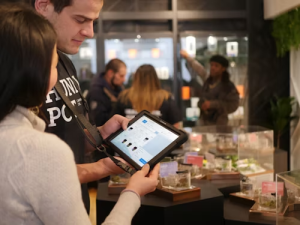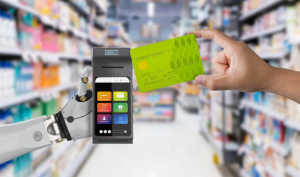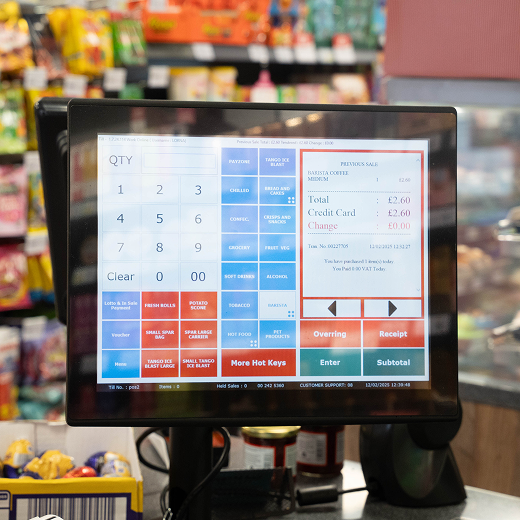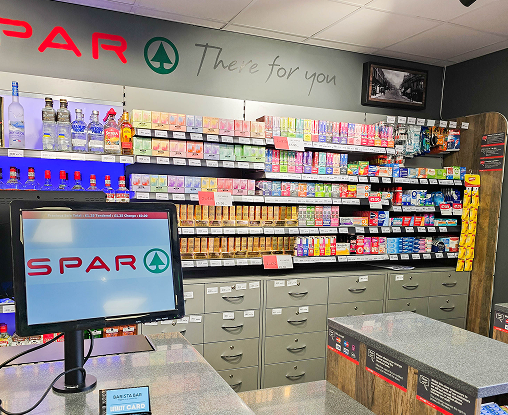The UK retail industry is undergoing one of its most profound transformations in decades. From high street shops to large supermarkets, retailers are under pressure to deliver faster service, reduce costs, and meet rising consumer expectations. Traditional EPOS (Electronic Point of Sale) systems have long been central to retail operations, but the integration of Artificial Intelligence (AI) is elevating their role to a new level.

An AI-powered EPOS is more than just a till, it’s a smart retail hub that predicts customer demand, prevents losses, tailors promotions, and streamlines decision-making. This blend of transaction processing and intelligent automation is reshaping how UK retailers operate day-to-day, driving efficiency and helping businesses remain competitive in an increasingly digital-first world.
This article aims to educate UK retailers on how AI-powered EPOS systems are transforming efficiency across the sector. It explores how artificial intelligence enhances sales forecasting, personalisation, automation, and fraud detection while highlighting real-world applications from leading UK retailers such as Tesco and Sainsbury’s.
What Is an AI-Powered EPOS System?
A traditional EPOS (Electronic Point of Sale) system helps retailers process sales, manage stock, and record customer transactions. While effective, its functions are often limited to basic data handling. The integration of Artificial Intelligence (AI) takes EPOS systems to a whole new level, transforming them into intelligent business tools that not only capture information but also analyse, predict, and optimise retail operations.
Here are the key features that set AI-powered EPOS systems apart:
- Predictive Demand Forecasting
AI algorithms analyse historical sales data, seasonal trends, and even external factors such as weather or local events. This enables retailers to accurately forecast demand, ensuring the right products are stocked at the right time. For example, an EPOS system in a UK grocery store can anticipate a spike in barbecue products when warm weather is predicted, helping avoid stockouts or overstocking.
- Smart Inventory Control
Instead of manual checks, AI-powered EPOS systems monitor inventory levels in real time. They can trigger automated reorders when stock runs low and even suggest optimal quantities to reduce waste. For UK retailers, this feature is particularly valuable in managing fresh produce, where overstocking often leads to spoilage and financial losses.
- Personalised Customer Engagement
AI analyses customer purchasing patterns and creates tailored promotions based on individual shopping behaviour. For example, if a customer regularly buys gluten-free products, the system can automatically generate offers for similar items. This personalisation not only increases sales but also enhances customer loyalty in an increasingly competitive retail environment.
- Fraud and Theft Detection
One of the strongest advantages of AI is its ability to spot unusual patterns that human staff might miss. By monitoring behaviour at tills and self-checkouts, AI can flag suspicious transactions, such as repeated voids, unusually high refunds, or potential “scan avoidance” incidents. This reduces shrinkage, a major cost for UK retailers.
- Voice and Mobile Support
AI-powered EPOS systems are designed with convenience in mind. Many now support voice commands for hands-free operation, enabling staff to multitask more effectively. Mobile integration also allows managers to track sales and stock remotely, giving them flexibility and real-time oversight across multiple locations.

How AI-Powered EPOS Systems Drive Retail Efficiency
1. Smarter Inventory Management
Inventory has always been a pain point for UK retailers. Overstocking ties up cash, while stockouts frustrate customers. AI-driven EPOS systems reduce these risks by analysing historical sales, seasonal spikes, and even local events.
- Example: Sainsbury’s has introduced AI-powered forecasting to cut waste and improve shelf availability as part of its £1bn cost-saving plan.
- Impact: Retailers keep just the right amount of stock, lowering costs while improving customer satisfaction.
2. Faster Checkout and Payment Options
Checkout queues are one of the biggest customer frustrations. AI-enhanced EPOS systems integrate self-service kiosks, scan-as-you-shop apps, and mobile wallets to make the process seamless.
- Tesco’s Scan as You Shop and Sainsbury’s SmartShop allow customers to scan items as they shop, skipping traditional queues.
- AI helps identify peak hours and adjust staffing or kiosk availability accordingly.
The result? Shorter queues, happier customers, and fewer staff tied up at tills.
3. Enhanced Security and Fraud Prevention
Retail crime costs UK retailers over £1 billion annually. AI-integrated EPOS systems strengthen security by linking with CCTV and computer vision tools.
- They can detect unusual transactions, flag suspicious returns, or monitor behaviour at self-checkouts.
- Morrisons, for example, has piloted AI-enabled shelf cameras that track inventory discrepancies, reducing theft-related losses.
This proactive approach saves money and reduces shrinkage without relying solely on human monitoring.
4. Personalised Marketing at Checkout
Customer loyalty is critical in a competitive retail market. AI-powered EPOS systems analyse purchasing history and loyalty card data to create personalised promotions in real time.
- Tesco uses Clubcard data to offer personalised discounts at checkout.
- Promotions are smarter tailored to shopper needs rather than generic offers boosting sales and engagement.
This personal touch helps customers feel valued and encourages repeat visits.
5. Workforce Optimisation
Retail staffing is another area where efficiency matters. AI-enabled EPOS dashboards can identify sales peaks and footfall patterns to optimise staff schedules.
- Fewer employees are left idle during quiet times.
- Additional staff can be allocated to cover busy hours, ensuring smooth service.
For retailers balancing rising labour costs with tight margins, this is a game-changer.
6. Mobile Agility and Real-Time Decisions
Modern cloud-based EPOS systems mean managers no longer need to be in-store to oversee operations. AI insights can be accessed via mobile apps, allowing owners to:
- Track live sales performance.
- Receive instant alerts about low-stock items.
- Approve discounts or manage pricing remotely.
This agility is particularly useful for small businesses or chains with multiple locations.
Real-World Examples in the UK
- Tesco – Clubcard + AI-Powered Challenges & Personalisation
Clubcard Reach: Over 23 million UK households now use Tesco Clubcard, about 82 percent penetration in the UK market. The program is credited with saving customers up to £385 per year on grocery bills.
AI-Driven Campaigns: In 2024, Tesco introduced Clubcard Challenges, an AI-powered, gamified loyalty initiative with campaigns lasting six weeks. One such campaign targeted 10 million customers, inviting them to undertake personalized spending challenges, with 76 percent converting to participants and 62 percent earning rewards, amounting to over half a billion Clubcard points distributed.
Strategic AI Use: Tesco CEO Ken Murphy forecasts leveraging AI to “nudge” healthier and more cost-effective shopping decisions, like flagging when baskets exceed dietary sodium limits and offering substitutions.
Operational Impact: Thanks to its data-driven strategy, Tesco reported half-year sales up 4 percent to £31.5 billion, and pre-tax profit rose 20 percent to £1.39 billion.
Tesco’s model turns EPOS data and AI loyalty tools into strategic levers, enhancing promotional personalization, customer engagement, and overall profitability.

- Sainsbury’s – AI Forecasting and Store Efficiency
- Sainsbury’s has embarked on a five-year partnership with Microsoft to become the UK’s “leading AI-enabled grocer.” They’re deploying generative AI to enhance everything from real-time restocking to interactive online shopping.
- These AI tools provide staff with real-time stock insights, reducing manual shelf checks and helping avoid lost sales due to out-of-stock products.
- As part of a broader £1 billion cost-cutting initiative, Sainsbury’s sees AI as a critical path to operational savings.
Sainsbury’s is using AI-powered EPOS and supply chain tools to streamline operations, enhance customer service, and achieve financial goals.
- Morrisons – AI Shelf Cameras & Automated Reordering
Morrisons partnered with Focal Systems to deploy AI-powered cameras inside stores that scan product availability on shelves continuously. These systems can detect when items are out of stock and reorder automatically, or alert staff if stock is available in the backroom.
This enables faster, more accurate restocking and significantly reduces errors or delays in inventory management.
- Primark & Currys – Automation at Checkout
Automation tech is being widely deployed across UK retail to counter rising labor costs, including electronic shelf labels, self-service tills, and warehouse robots.Currys is rolling out electronic pricing displays, while Primark and Next are expanding self-service checkout systems to speed customer flow.
These examples show that both large supermarkets and high-street brands see AI-powered EPOS as a crucial part of future growth.

Benefits at a Glance
AI-powered EPOS systems are transforming the way UK retailers operate by bringing efficiency, accuracy, and intelligence to day-to-day processes. From supermarkets to high-street chains, these systems go beyond traditional tills and act as central hubs for data-driven decision-making. They allow businesses to forecast demand with greater precision, reduce food waste, and prevent costly stockouts. At the checkout, AI enables faster transactions through self-service kiosks and contactless options, helping stores handle peak footfall without long queues. On the security side, integrated fraud detection and theft prevention tools protect retailers from losses, while marketing modules personalise offers that strengthen customer loyalty.
For staff, smarter scheduling minimises idle time and ensures the right number of workers are on shift, reducing labour costs. For managers, real-time dashboards provide insights that make decision-making faster and more effective. In short, AI-driven EPOS systems optimise every corner of retail operations, from inventory shelves to boardroom strategies.
| Area | Benefit |
| Inventory | Less waste, fewer stockouts, and smarter reordering |
| Checkout | Faster, contactless, self-service options |
| Security | Fraud prevention and theft reduction |
| Marketing | Personalised offers and improved loyalty engagement |
| Staffing | Smarter schedules and reduced idle time |
| Management | Real-time decision-making with mobile dashboards |
Challenges to Adoption
Here are the biggest challenges retailers face when adopting AI‑powered EPOS, with the facts, rules and realities that make each one tricky in practice:
1) Upfront investment and total cost of ownership
AI features often sit behind higher‑tier licences, cloud fees and new peripherals like cameras, 2D‑barcode scanners and edge devices. That creates a cash flow hurdle for independents and small chains. The tax regime helps but does not remove the barrier: “full expensing” for qualifying IT kit was made permanent, and the Annual Investment Allowance remains at £1 million, which can soften the capital hit yet still requires cash on day one.
2) Data protection, marketing consent and cookies
Personalised offers at the till rely on lawful processing under UK GDPR and strict rules under PECR. Retailers need clear consent or a valid soft opt‑in for email and SMS marketing, and must give users a real choice on cookies and similar technologies used for profiling across apps, kiosks and websites. Getting this wrong risks enforcement and reputational damage.
3) Biometrics and computer vision in stores
Linking EPOS with facial recognition or behaviour analytics raises special‑category data issues. The ICO has warned that live facial recognition in public places is highly intrusive and demands robust necessity, proportionality and DPIAs. Several UK deployments have attracted scrutiny, so retailers should expect heightened compliance work and potential challenge if they rely on biometric identification for loss prevention or age checks.
4) Cyber risk, ransomware and supply‑chain failures
Retail has been targeted by recent UK cyber incidents, prompting the NCSC to issue specific guidance for the sector. Even without a direct breach, third‑party outages can stop tills from taking payments, as seen during the July 2024 global software incident that left UK shops switching to cash only. Government consultations note ransomware reports at their highest since 2019 and a doubling of victims on leak sites since 2022, which raises insurance, resilience and incident‑response costs for retailers.
MPOS: The Smartest AI-Powered EPOS Choice for UK Convenience Stores
MPOS EPOS uses AI for computer-vision stock tracking, real-time loss prevention, automated discrepancy and fraud detection, and analytics that translate into staffing, pricing, and merchandising decisions. It integrates these capabilities into the existing MPOS toolkit, which lets UK retailers cut manual checks, act on live risks, and improve profitability with fewer administrative cycles.
What MPOS AI is
MPOS AI is an add-on that connects the MPOS retail platform with Visu AI. It uses computer vision and machine-learning models to watch what happens on shelves and at tills, then pushes real-time alerts and insights into your EPOS workflow. The aim is tighter stock control, stronger loss prevention, and faster, data-driven decision-making without extra manual effort.
Automated inventory tracking and discrepancy detection
AI models identify products on shelves, track their movement, and update stock status instantly. If items are removed without a sale, or if on-hand levels and expected levels drift apart, MPOS AI flags the discrepancy so staff can act before it becomes shrink or an empty shelf. The same object recognition helps reduce miscounts and prevents phantom stock, which improves on-shelf availability with minimal manual checks.
Real-time loss prevention at checkout and on the shop floor
The platform looks for high-risk behaviours and known fraud patterns. Examples include product voids that do not match customer behaviour, “sweethearting” at the till, lottery or scratchcard irregularities, and unusual cash activity. If the AI sees unauthorised object movement or a suspicious checkout sequence, it sends an alert immediately so staff can intervene. This turns passive CCTV into active, event-driven prevention and reduces the time managers spend trawling footage.
Faster, cleaner self-service with intelligent safeguards
Self-service is part of the MPOS suite, and MHouse describes AI-assisted controls that minimise errors and theft at unattended checkouts. Computer vision and weight checks can verify that scanned and bagged items match, while alerts notify colleagues when intervention is needed. The net effect is shorter queues with less shrink, supported by automation rather than additional staffing.
Actionable merchandising and layout insights
Because the system recognises objects and tracks movement, it can highlight hot and cold zones, show which product placements convert, and suggest adjustments to store layout or planograms. These insights feed directly into the MPOS back office so teams can change pricing, promos, or facings and then measure the impact in sales data.
AI-powered reporting that cuts admin
MHouse highlights AI-powered reporting that replaces manual spreadsheets and speeds up routine analysis. One documented result is an 18 percent payroll cost reduction when staffing was optimised against sales patterns. Other examples on the site include a 35 percent shrinkage cut after adopting MPOS loss-prevention tooling, 12 percent procurement savings via smarter supplier analytics, and more than 20 hours per week saved by eliminating manual stock reconciliation.
Seamless EPOS integration and mobile visibility
MPOS AI is designed to bolt onto the existing MPOS environment. Alerts and insights appear where teams already work, including the back office and mobile apps, so managers can approve actions, check live sales, or react to stock issues from anywhere. This keeps the cycle tight from detection to decision to action.
Future Trends to Watch
- Hyperlocal Retailing: AI tailoring promotions and stock to local neighbourhood demands.
- Voice-Powered EPOS: Voice assistants handling transactions and customer support.
- IoT Integration: Smart shelves and e-labels syncing stock data directly with EPOS.
- Advanced Analytics: Heatmaps and behaviour tracking to improve store layouts.
The future of UK retail is data-driven, and EPOS systems will continue evolving into multi-functional, AI-powered retail engines.
Conclusion
AI-powered EPOS systems are no longer optional, they are becoming a necessity for UK retailers seeking efficiency and competitiveness. By combining smart inventory control, faster checkouts, personalised marketing, and better workforce management, these systems help retailers save money and delight customers. Beyond the operational wins, AI adoption signals a cultural shift in retail, where data-driven decision-making becomes the norm rather than the exception.
For convenience stores and supermarkets alike, the ability to anticipate demand, reduce shrinkage, and optimise staff resources directly impacts margins in a low-profit, high-competition market. Retailers that delay investment risk falling behind not only in efficiency but also in customer loyalty, as shoppers increasingly expect personalised offers, seamless payments, and faster service as standard.
Crucially, AI-powered EPOS is also shaping sustainability in retail. By helping cut food waste, reduce energy consumption through smarter stocking, and enable more accurate supply chains, these systems support retailers in meeting their environmental and ESG commitments. This makes them as much a long-term strategic investment as a short-term operational upgrade.















